人教版选修B6Unit2单词学案设计 无答案
人教版英语选修六Unit 2 poems(词汇)表格课程教学设计
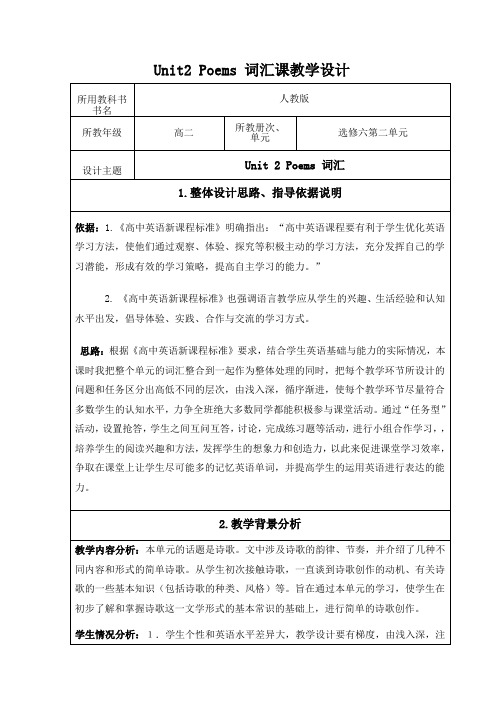
所用教科书
书名
人教版
所教年级
高二
所教册次、
单元
选修六第二单元
设计主题
Unit 2 Poems 词汇
1.整体设计思路、指导依据说明
依据:1.《高中英语新课程标准》明确指出:“高中英语课程要有利于学生优化英语学习方法,使他们通过观察、体验、探究等积极主动的学习方法,充分发挥自己的学习潜能,形成有效的学习策略,提高自主学习的能力。”
2. 能力目标:
Enable the students to know more about the poems, including the reason why people write poems and the simple types of poems.
3. 情感价值观:
Enable the students to learn more about poems.
学生情况分析:1.学生个性和英语水平差异大,教学设计要有梯度,由浅入深,注意层次性。教师要抓住学生的心理, 激发学生的学习兴趣,让他们在学习中学会参与,在参与中学会学习。
2.根据学生的心理特征,采用视、听、说的教学方法,从感性认识入手,逐渐上升到理性认识,培养学生运用英语进行表达的能力。
3.教学目标分析
设计意图:填空形式是训练学生运用所输入的信息进行信息加工和信息输出的一个重要环节。
步骤6:Homework(作业)
Grasp the phrases, and tell the difference between some phrases.
设计意图:培养学生使用相关语言分辨词汇,并能正确使用语言的能力。
1. 知识目标:
a. 重点词汇和短语
人教版高中英语选修六第2单元poems 词汇导学案设计(无答案)
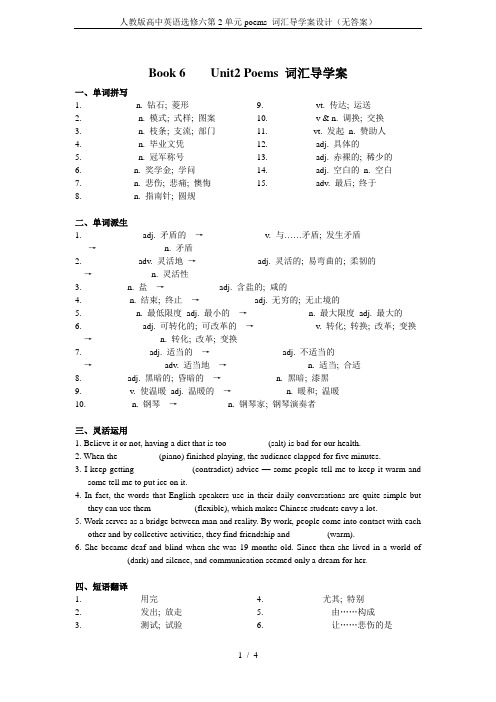
人教版高中英语选修六第2单元poems 词汇导学案设计(无答案)Book 6 Unit2 Poems 词汇导学案一、单词拼写1. ____________n. 钻石; 菱形2. ____________ n. 模式; 式样; 图案3. ____________ n. 枝条; 支流; 部门4. ____________ n. 毕业文凭5. ____________ n. 冠军称号6. ___________ n. 奖学金; 学问7. ___________ n. 悲伤; 悲痛; 懊悔8. ___________ n. 指南针; 圆规9. ___________ vt. 传达; 运送10. __________ v & n. 调换; 交换11. __________vt. 发起n. 赞助人12. __________ adj. 具体的13. __________ adj. 赤裸的; 稀少的14. __________ adj. 空白的n. 空白15. __________ adv. 最后; 终于二、单词派生1. _____________ adj. 矛盾的→____________v. 与……矛盾; 发生矛盾→______________ n. 矛盾2. ____________ adv. 灵活地→____________adj. 灵活的; 易弯曲的; 柔韧的→____________ n. 灵活性3. __________n. 盐→__________ adj. 含盐的; 咸的4. __________ n. 结束; 终止→__________ adj. 无穷的; 无止境的5. ____________n. 最低限度adj. 最小的→____________n. 最大限度adj. 最大的6. _____________ adj. 可转化的; 可改革的→_____________v. 转化; 转换; 改革; 变换→_____________ n. 转化; 改革; 变换7. _______________adj. 适当的→_______________ adj. 不适当的→_______________ adv. 适当地→________________ n. 适当; 合适8. __________adj. 黑暗的; 昏暗的→__________ n. 黑暗; 漆黑9. __________ v. 使温暖adj. 温暖的→__________ n. 暖和; 温暖10. __________n. 钢琴→_________ n. 钢琴家; 钢琴演奏者三、灵活运用1. Believe it or not, having a diet that is too _________(salt) is bad for our health.2. When the _________(piano) finished playing, the audience clapped for five minutes.3. I keep getting ____________ (contradict) advice — some people tell me to keep it warm andsome tell me to put ice on it.4. In fact, the words that English speakers use in their daily conversations are quite simple butthey can use them _________ (flexible), which makes Chinese students envy a lot.5. Work serves as a bridge between man and reality. By work, people come into contact with eachother and by collective activities, they find friendship and ________(warm).6. She became deaf and blind when she was 19 months old. Since then she lived in a world of_________(dark) and silence, and communication seemed only a dream for her.四、短语翻译1. _____________用完2. _____________发出; 放走3. _____________测试; 试验4. _____________尤其; 特别5. _______________由……构成6. _______________让……悲伤的是7. ______________轻松; 从容; 不紧张8. ______________把……转化成/变成……五、短语运用1. 在众多爱好中, 我特别喜欢写诗。
B6U2语法学案设计(人教版选修六第二单元语法学案设计).doc
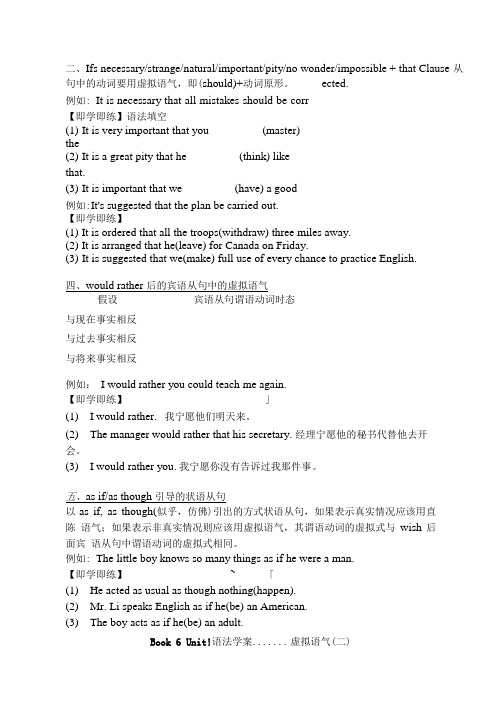
二、Ifs necessary/strange/natural/important/pity/no wonder/impossible + that Clause 从句中的动词要用虚拟语气,即(should)+动词原形。
ected.例如: It is necessary that all mistakes should be corr【即学即练】语法填空(1)It is very important that you ________ (master)the(2)It is a great pity that he ________ (think) likethat.(3)It is important that we ________ (have) a goodcon例如:It's suggested that the plan be carried out.【即学即练】(1)It is ordered that all the troops(withdraw) three miles away.(2)It is arranged that he(leave) for Canada on Friday.(3)It is suggested that we(make) full use of every chance to practice English.四、would rather 后的宾语从句中的虚拟语气假设宾语从句谓语动词时态与现在事实相反与过去事实相反与将来事实相反例如:I would rather you could teach me again.【即学即练】」(1)I would rather. 我宁愿他们明天来。
(2)The manager would rather that his secretary. 经理宁愿他的秘书代替他去开会。
(3)I would rather you.我宁愿你没有告诉过我那件事。
高二英语 Book6 Unit2 Words教案-人教版高二全册英语教案

①It takes a load off my mind to leave the child in your charge.
把孩子托付给你我就放心了。
②She thought she would not be able to bear the load of bringing up her family alone.
cultural exchange文化交流
①I've offered to paint the kitchen in exchange for a week's accommodation.
我愿意粉刷厨房,条件是让我免费住宿一周。
②I will take full advantage of the chance to exchange views with them.我将充分利用这次机会与他们交换看法。
课题
Book6 Unit2 Words
课时
共1课时
本节第1课时
选用教材
人教版
知识模块
选修六
课型
复习
教学目标
Master how to use some important words.
重点
convey, transport, exchange, load
难点
词汇在具体语境中的灵活运用。
关键
记住词意及用法,在具体语境中会翻译,会找题眼。
[经典例句]It was an event that would transform my life.(牛津P2148)那是能够彻底改变我一生的一件事。
(1)transform ...into ...使……变成……
transform into转化成;改造为
高中英语 Unit2 Poems导学案(无答案)新人教版选修6 学案

Book6 Unit 2 PoemsPeriod one Vocabulary StudyⅠ. Fill the blanks with proper words.1. poet poem poetic poetryOnly by writing a in language can I convey my deep love for my mother.Only after I finished reading his collection of religious did I understand his solid belief in God.Only if you use lots of expressions in your writing can you get high grades.2. convey emotions/ message/an idea/thanks/loveAds the message that thin is beautiful.All the information can be in the simple diagram(图表).3. flexible/ inflexible/flexibilityShanghai began testing a retirement system last October.We appreciate your in dealing with the matter.4. take it/things easy take sth. seriously take one’s time________________________. Everything will go on well.________________________. We are waiting for you.____________everything , you will accomplish you dream.5. run out of run outWild with anger, the teacher the classroom.To make matter worse, we our candles. So we have to stay here in the darkness. With all the money , we have to go home on foot.6. be made up of/ consist of/ make up Women only a small proportion of the prison population.The committee representatives from every state.7. in particular particularly be particular aboutMarty about his food. He is not easily satisfied.We are hoping to expand our business, Europe .Steve was in bad mood when he got back.8. exchange ideas/opinions in exchange for exchange sth. for sthI have offered to paint the kitchen a week’s accommodation(住宿).It is a place where you can chat and .He a blue jacket a black one.9. let sth. out let alone let sb. downWhen I found a car rushing past me, I a cry in surprise.It is no good the secret. If so, you will be unemployed.There is no denying that the baby can’t even sit up yet, walk.There is no doubt that the worst feeling is having our fans .Ⅱ.Exercises one:1. I think you probably know that China has adopted a policy in her foreign trade.2. Mon added salt but it still wasn’t enough.3. To our great relief, he got a job and moved to a new flat.4.I can’t put up with his complaints any more.5. Looking after a car costs a of 10,000 yuan.6. Take it easy. Success will always you as long as you have faith in your mind.7. Our company will set up a in Paris.8. Seeing a ragged child with feet in the cold winter, the little girl gave all her pocket money to him.1. Don’t take what he said seriously ----he was only .2. She found it hard to her feeling in words at the moment.3. Constant will make everybody feel bored, even though you are president of the school.4. The answer to the question were various and .5. Women tend to be , while men are sensible when facing problems.6. Have you got any suggestions on how to deal with these difficulties.1. she has been with the kids for hours and is beginning to patience.2. Life happiness and sorrow.3. It was a good concert-----I enjoyed the last song .4. I cannot what he said just now.5. “ .” The doctor said to the patient. “You have been making greatprogress.”6. America has also produced jazz, which all age groups all over the world. 1. These days, even a walk in the woods can be a sport. 2. , many people died in the earthquake.3. Because of the global warming, we should plant trees at this time.4. The idea sounds fine, but we need to it in practice.5. Faced with lots of difficulties, my mind .Vocabulary Exploration1. 把押韵的诗做记号。
英语选修6学案Unit2(book6)
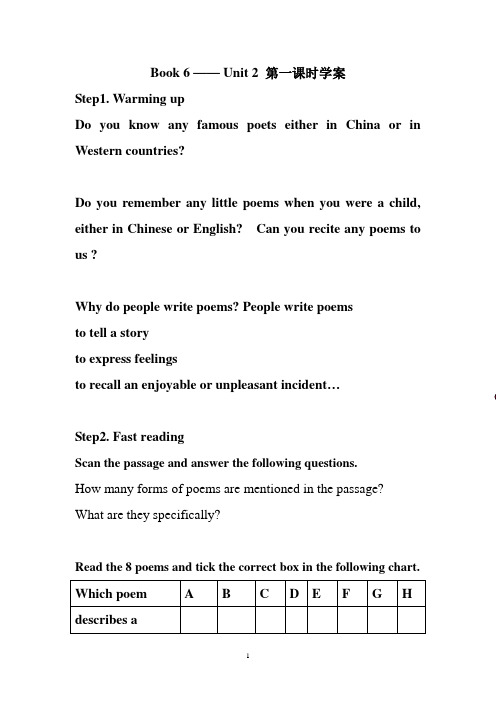
Book 6 —— Unit 2 第一课时学案Step1. Warming upDo you know any famous poets either in China or in Western countries?Do you remember any little poems when you were a child, either in Chinese or English? Can you recite any poems to us ?Why do people write poems? People write poemsto tell a storyto express feelingsto recall an enjoyable or unpleasant incident…Step2. Fast readingScan the passage and answer the following questions.How many forms of poems are mentioned in the passage? What are they specifically?Read the 8 poems and tick the correct box in the following chart. Which poem A B C D E F G H describes aperson?tells a story?describes anaspect of aseason?is about sport?is about thingsthat don’t makesense?describes a riverscene?has rhymingwords at the endof lines?repeats wordsand phrases?Step 3 Careful readingNow let’s listen to the introductions of the following 8 poems and finish tasks.Listen to Poem A and pay attention to its rhyming lines and words, and then think about the following questions.1.What does poem A mainly talk about?Then, listen to poem B and C and answer the following Qs2. What does poem B and poem C mainly talk about?3. Did his or her team win the game?4. Why his or her team didn’t win the game?5. Does the speaker really believe his or her own excuse? How do you know?Poem D&E7. W hat’re Poems D and E about? Do the authors like the subjects of the two poems? Give reasons for your answer.8. What do poem F and G talk about?Now, listen to the Poem H from Tang dynasty9. What is the story that the poem tells? Tell the story in your own words.10. Underline one or more of the feelings below that you think the woman has. Give reasons for your answers: loneliness joy love trust anger hate sorrowStep 4 Summary and DiscussionAfter enjoying these five types of poem, can you tell me the their features?featuresForms ofpoemsNurseryrhymes(A)List poems (Band C)Cinquain (Dand E)Haiku(F and G)Tang poems(H)Discussing in groups: Are poems good for our life? What can we get from poems?Step 5 Homework1. Review the text and pay attention to some key words, phrases, and sentences.2. Surf the internet to appreciate and recite more English poems.。
高中英语人教版选修6【教学设计】Unit 2
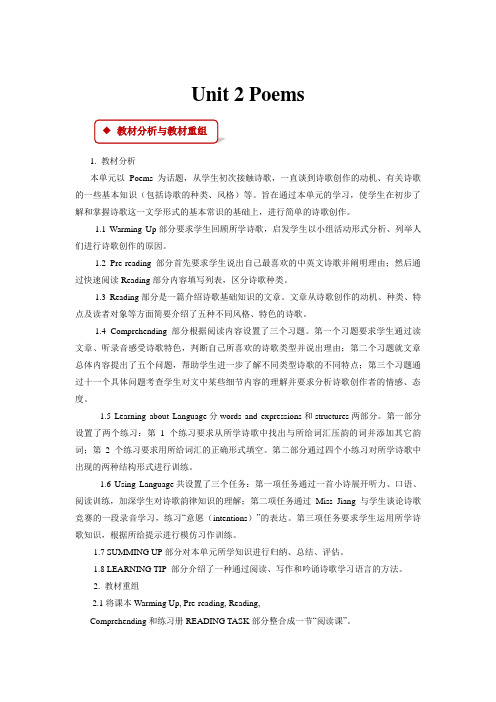
Unit 2 Poems1. 教材分析本单元以Poems为话题,从学生初次接触诗歌,一直谈到诗歌创作的动机、有关诗歌的一些基本知识(包括诗歌的种类、风格)等。
旨在通过本单元的学习,使学生在初步了解和掌握诗歌这一文学形式的基本常识的基础上,进行简单的诗歌创作。
1.1 Warming Up部分要求学生回顾所学诗歌,启发学生以小组活动形式分析、列举人们进行诗歌创作的原因。
1.2 Pre-reading 部分首先要求学生说出自己最喜欢的中英文诗歌并阐明理由;然后通过快速阅读Reading部分内容填写列表,区分诗歌种类。
1.3 Reading部分是一篇介绍诗歌基础知识的文章。
文章从诗歌创作的动机、种类、特点及读者对象等方面简要介绍了五种不同风格、特色的诗歌。
1.4 Comprehending 部分根据阅读内容设置了三个习题。
第一个习题要求学生通过读文章、听录音感受诗歌特色,判断自己所喜欢的诗歌类型并说出理由;第二个习题就文章总体内容提出了五个问题,帮助学生进一步了解不同类型诗歌的不同特点;第三个习题通过十一个具体问题考查学生对文中某些细节内容的理解并要求分析诗歌创作者的情感、态度。
1.5 Learning about Language分words and expressions和structures两部分。
第一部分设置了两个练习:第1个练习要求从所学诗歌中找出与所给词汇压韵的词并添加其它韵词;第2个练习要求用所给词汇的正确形式填空。
第二部分通过四个小练习对所学诗歌中出现的两种结构形式进行训练。
1.6 Using Language共设置了三个任务:第一项任务通过一首小诗展开听力、口语、阅读训练,加深学生对诗歌韵律知识的理解;第二项任务通过Miss Jiang与学生谈论诗歌竞赛的一段录音学习,练习“意愿(intentions)”的表达。
第三项任务要求学生运用所学诗歌知识,根据所给提示进行模仿习作训练。
1.7 SUMMING UP部分对本单元所学知识进行归纳、总结、评估。
Unit2 教案(2)(人教版选修六)

Unit 2 Poems7th period GrammarThe Subjunctive Mood (2)1.教材分析(the analysis of teaching materials)This teaching period mainly deals with the grammar: the subjective mood (2). We have learned two kinds of subjective mood in unit 1. In this period we will continue to focus on another kind of subjective mood.2.学情分析(the analysis of the students)In the process of learning English, Ss have learned some sentences using the subjunctive mood. So teacher can use some common sentences to le ad in.知识目标(Knowledge aims)a. Enable students to learn how to use the subj unctive mood.b. To enable the students to use the subjective mood correctly and properly.能力目标(Ability aims)a. Get the students to understand and sum up th e grammatical points. Meanwhile tryto master these rules.b. Learn to use the target sentence patterns to talk about situations that are nottrue or not likely to become true at present.情感目标(Emotion aims)a. Get Ss to become interested in grammar learning.b. Develop Ss’ sense of comparing and summarizing.4.教学重点和难点(teaching important points and difficult points)a. Help the students master t wo structures about the subjunctive mood.b. Get the students to learn how to use the two structures about the subjunctive mood.5.教学过程(Teaching procedures)Step I: GreetingsStep II: ReviewingWh en the verb “wish” is followed by an object clause, i ts predicate must be with the subjective mood. The past tense (were/did) is often used to express the situation contrary to the present, the past perfect tense (had+done) is often used to express the situation contrary to the past and “could/would+ v.” is often used to express the situation contrary to the future.Eg: I wish I were as tall as you.He wished he hadn’t said that.I wish it would rai n tomorrow.Step III Discovering useful structure虚拟语气在其他从句中的运用1. as if/as though 引导的状语从句或表语从句,有时用虚拟语气。
- 1、下载文档前请自行甄别文档内容的完整性,平台不提供额外的编辑、内容补充、找答案等附加服务。
- 2、"仅部分预览"的文档,不可在线预览部分如存在完整性等问题,可反馈申请退款(可完整预览的文档不适用该条件!)。
- 3、如文档侵犯您的权益,请联系客服反馈,我们会尽快为您处理(人工客服工作时间:9:00-18:30)。
B6U2 Words and Expressions【学习目标】1. To enlarge the students’ vocabulary.2.To enable us to grasp the following important words and phrases: convey , take it easy , run out of , be made up of, exchange, appropriate, in particular.【学习导航】I. 写出搭配(P. 10-P. 14)1. 向某人表达某事________________________2. 童谣歌谣___________________________3. 一个具体的建议_________________________4. 矛盾的______________________________5. 钻戒_____________________6. 灵活的方式_________________________7. 句型__________________________ 8. 放轻松别紧张_________________________9. 精力耗竭___________________________ 10. 班容量60人______________________ 11. 取笑某人______________________________ 12. 咸水___________________________13. 把某事翻译成某事_______________________ 14. 尤其是_______________________15. 转变成_________________________ 16. 处于悲痛之中__________________17. 光脚__________________________ 18. 对某人做某事是合适的__________________19. 与某人交换某物_______________________ 20. 头脑空白_______________________21. 试用产品____________________________ 22. 赢得申请奖学金______________________13. 放声大哭________________________ 24. 承受...负担________________________II.构词法( Word Formation )1. sorrow n.→____________ adj.2. translation n.→_______________ vt.→___________ n.译者3. eventually adv. →___________ adj.4. salt n.→________adj.5. library n.→________ n.图书管理员6. champion n.→ _________ n.冠军称号7. warm adj. →_________ n.8. piano n.→_________ n.钢琴家9. poetry n. 诗(总称);诗意→ _________ n.诗人→ ________ n.诗(可数)10. repetition n.→___________ vt.11. endless adj.→ ____________n.末端;尽头→___________ n.结尾;结局12. dark adj→________ n.III. 精讲释义1convey vt.【寓词于境】(1)Colours like red convey a sense of energy and strength.(2) Please convey my apologies to your wife.(3) The survivors from Sichuan Earthquake have been conveyed to safe places.【用法归纳】convey sth. to sb.意为____________; convey sb./sth. from A to B 意为____________ ;【完成句子】(1) 作为老师,他确切地知道怎样向学生表达他的想法。
As a teacher,he knows exactly _____________________________________the students.(2) 我觉得难以用言语表达我的感情。
I found it difficult to ______________________________.2. flexible【寓词于境】(1)He is so flexible that he can adjust himself to any situation. 含义:________________(2) Our plans are quite flexible.含义:_____________3. Take it easy【寓词于境】(1) Take it eas y and tell us what happened. 含义:_____________(2) Take it eas y ,and you will make it. 含义:_____________【翻译词组】take one’s time _________ take sth for grante d ____________________take one's chance _______ take sth seriously ______________take apart ______________ take in_______________________take off_________________ take on _______________________take up _______________ take over ___________________4 . run out of【寓词于境】(1)My car broke down on the way to the beach because it had run out of petrol. 含义:_____________(2)In the future,care for the environment will become very important as earth’s natural resources run out.(3)His strength gave out after he ran that long distance. 含义:_____________(4)My money has been used up,so I have to return home. 含义:_____________【用法归纳】run out of= use up vt.及物动词短语主语常是_______________run out= give out vi.不及物动词短语主语常为_______________【完成句子】(1) They________ (用光了)all the building materials.(2). We_______________ (用完了所有的精力)in the tiring work.(3) .不幸的是我们用完了所有粮食(food supplies) 。
______________________________________5 be made up of【寓词于境】(1)The committee is made up of 12 members.含义:_____________【用法归纳】be made up of= consist of【翻译句子】生活是由琐事组成的。
Life __________ __________ __________ __________ little things.Life __________ __________ little things.6. exchange n v交换; 兑换(货币); 调换; 更换【寓词于境】(1)He exchanged the blue sweater for a red one. 他把蓝毛衣换成了红的.(2)Ali exchanged seats with Ben. 阿里与本调换了座位.(3)Would you like my old TV in exchange for this camera?【用法归纳】exchange A for B意为______________; exchange sth (with sb) 意为____________,in exchange for…意为_________【翻译】exchange students____________ exchange experience__________exchange greetings________【完成句子】(1) May I __________ __________ __________ __________? (与你交换座位)(2) I'd like to __________some pounds __________ dollars. (把一些英镑兑换成美金)(3) Tom gave Helen an apple __________ __________ __________(作为交换) a piece of cake.(4) You must exchange your ideas ________each other.7. appropriate adj. 适当/恰当的【寓词于境】Sports clothes are not appropriate for / to a formal wedding. 含义:_____________【完成句子】(1) 现在讨论这个问题的时机不合适。
This isn’t the____________ time to discuss the problem.(2) His clothes __________ __________ __________ __________(对……合适)such a season.8. try out 测试;试验【寓词于境】(1).I think I will try out his way. 含义:_____________(2).We’d like to try out the product before we buy it. 含义:_____________(3). His brother’s example inspired him to try out for the football team. 含义:_____________ 【自我归纳】①try out是及物动词词组,后面可跟名词或代词,但代词要放在短语的_________。
